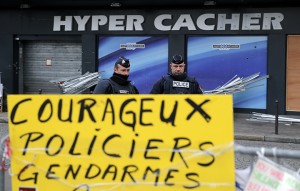
By Lorne Cook and Sylvie Corbet
Associated Press
PARIS — Reeling from the Paris terror attacks, France announced broad new measures to fight homegrown terrorism like giving police better equipment and hiring more intelligence agents, as European officials sought to strike the right balance between rushing through tough counterterrorism laws and protecting treasured democratic rights.
Prime Minister Manuel Valls laid out the counterterrorism initiatives just as the Paris prosecutor announced preliminary charges against four men for allegedly providing logistical support to one of the attackers behind a three-day spree of violence this month that killed 17 people before the three gunmen were shot dead by police.
France plans to spend 425 million euros ($490 million) over the next three years for the new measures. They include leaning on Internet companies and social media to help in the fight, creating an improved database of suspected extremists, and increasing intelligence-gathering on jihadis and other radicals — in part by making it easier to tap phones. About 2,600 counter-terrorism officers will be hired, 1,100 of them specifically for intelligence services.
Meanwhile, at the European Union headquarters in Brussels, new efforts are being made to overcome privacy objections and make the sharing of air passenger information easier. But continental leaders warned also about going too far, at the risk of undermining individual rights that are a cornerstone of the European way of life.
“The last thing” is for Europeans “to change the nature of our open societies as a reaction to this threat. Because then, we would play into the hands of these terrorists,” EU Vice President Frans Timmermans said.
Some calls have emerged for a European equivalent of the U.S. Patriot Act, which was passed within weeks of the Sept. 11 attacks, to strengthen the hand of authorities to prevent terrorism. Some of its components were controversial — like the unprecedented authority to search, seize, detain or eavesdrop in pursuit of suspected terrorists.
“That is not the way to go,” Sophie In’t Veld, a leading Liberal civil rights lawmaker at the European Parliament, told The Associated Press. “We should use more than two weeks to think about this, instead of rushing things through.”
Isabelle Falque-Pierrotin, head of France’s national data protection agency CNIL, told reporters her agency would insist that any additional snooping privileges for France’s intelligence services should only be allowed if they are matched by greater protections for personal data.
France has repeatedly strengthened its counterterrorism laws over the years, including a measure passed in November that focused on preventing extremists from joining fighters abroad. One measure, set to be activated in the coming weeks, would allow authorities to ask Internet service providers to block sites that glorify terrorism.
Despite rights concerns, the EU feels it can move forward on several fronts and the first stop is airports.
Up to three new measures to better screen and detect suspect electronic devices carried onto flights are in the pipeline, said an official involved in drawing up the EU’s new security strategy. He wasn’t allowed to speak publicly about the process and wouldn’t elaborate on the measures.
Authorities across the continent are concerned about more than 3,000 Europeans who have traveled to fight in Syria and Iraq, and have noted the difficulty in tracking them. The three gunmen in the Paris attacks claimed allegiance to the Islamic State group and al-Qaida in Yemen.
More than 1,200 French citizens and residents are now linked to foreign jihad, French officials say. Defense Minister Jean-Yves Le Drian said Wednesday about 10 former French soldiers are among those who have gone to Syria or Iraq to fight with Islamic extremists, but insisted the phenomenon remains an “extreme rarity.”
EU countries are pushing for a quick agreement on the sharing sensitive air passenger information. The bloc has passenger name record, or PNR, agreements with the U.S., Canada and Australia but has been unable to agree on one among its own 28 members.
The EU system would oblige airlines to provide the authorities with data on people entering or leaving the bloc, vital to tracing foreign fighters. Privacy concerns have stalled the legislation in the European Parliament. In frustration, some EU states have decided to go it alone with their own PNR-like systems and interconnect them with other partners.
On the ground, experts are looking at ways to check travel documents at the EU’s borders to the outside world without stopping everybody. By law, only random checks are permitted to ensure that people do not pose a “genuine, present and sufficiently serious threat.”
To be more present in the region, the EU aims to send security attaches to countries like Egypt and Yemen, and wants to help build the counter-terror capacity of countries in the Middle East, the Gulf and North Africa.
Recently France and Belgium have deployed soldiers in the streets, particularly around public buildings, but defending soft targets like supermarkets or sports events is the big challenge. French President Francois Hollande’s office announced Wednesday that the government now plans to cut 7,500 fewer jobs from the military, to better fight terrorism.


